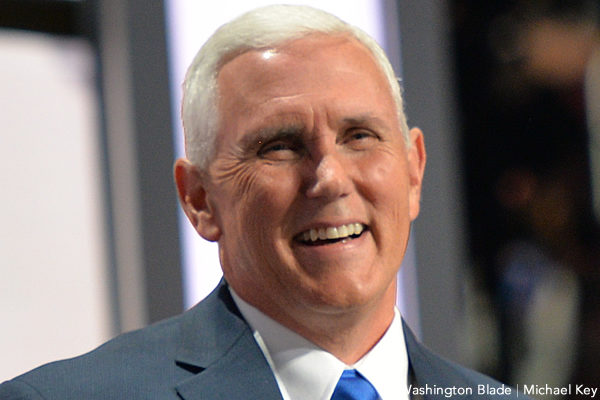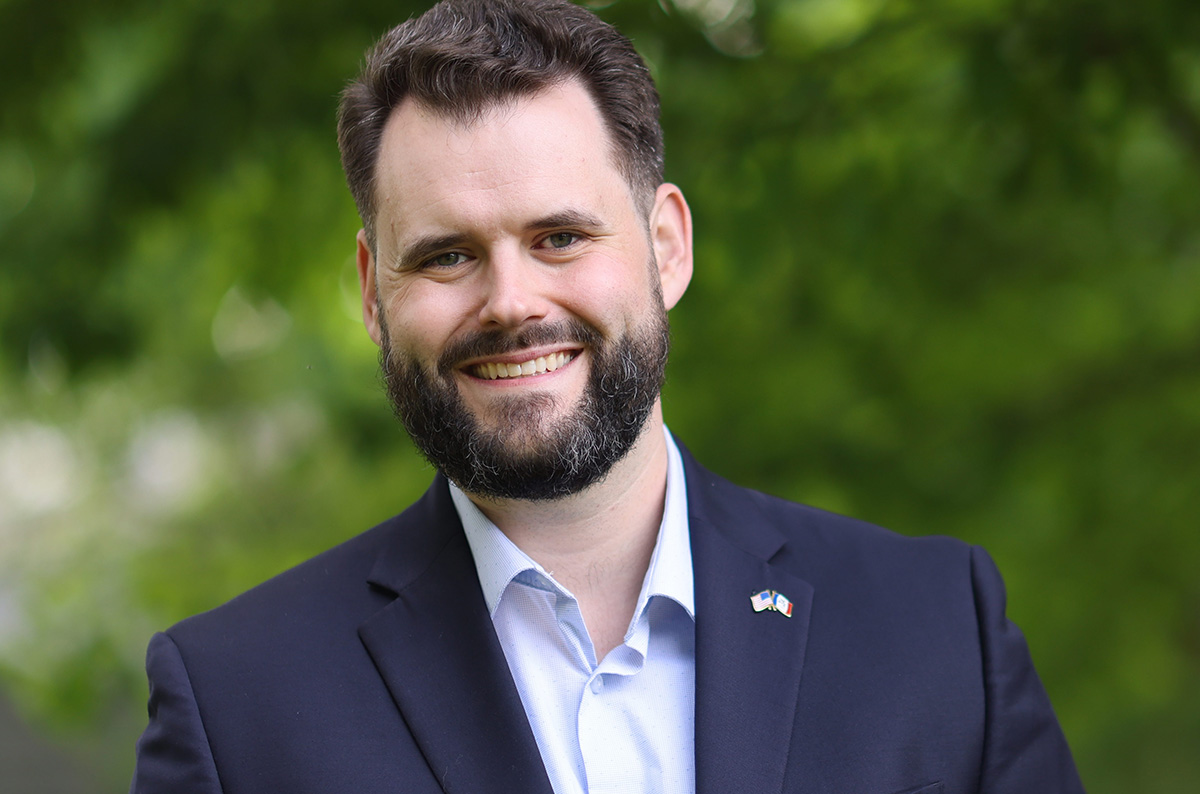Opinions
Mike Pence stands in stark contrast to Biden’s VP shortlist
LGBTQ people cannot take anything for granted and we cannot stay home


With just 92 days to go until one of the most consequential elections of our lifetime, all eyes are on Joe Biden. This week, he is expected to reveal his Vice Presidential pick. As LGBTQ Americans, we are paying particularly close attention. Despite what some pundits would have us believe, the Vice President matters. When Joe Biden was Vice President, he pushed the Administration to move forward on marriage equality. As Vice President, Mike Pence has led the charge for Donald Trump and put LGBTQ people and our equality in unprecedented peril.
GLAAD has tracked more than 165 attacks in policy and rhetoric from President Trump, Vice President Pence, and the Administration’s appointees since they took office in January 2017. It started on day one with the removal of all mentions of LGBTQ people and policy from the official White House web site and has continued nonstop. With Pence at his side in May 2017, Trump signed the first of several so-called “religious liberty” executive orders, paving the way for newly-sanctioned discrimination in public life. Later that year in a closed-door and unannounced event, Trump and Pence posed proudly for a photograph in the Oval Office with notorious anti-LGBTQ activists. Meanwhile, following Trump’s egregious attempt to ban transgender service members, Pence argued behind closed doors for the elimination of their health care benefits. In a moment of unvarnished observation, The President reportedly joked of Pence when asked about LGBTQ rights: “Don’t ask that guy—he wants to hang them all!”
Sadly, we knew the danger of a Pence Vice Presidency from the moment Donald Trump put him on the ticket, so none of this came as a surprise to us. As governor of Indiana, Pence earned national notoriety for signing a so-called “religious freedom” bill that anti-LGBTQ activists in his state championed for the purposes of allowing business owners the right to refuse service to LGBTQ customers. After outcry and boycotts, Pence was forced to sign an amended version that made it clear the law cannot be used to discrimination on basis of sexual orientation or gender identity. And in his first run for Congress, vowed to oppose marriage equality and give employers a license to discriminate against LGBTQ people in the workplace. Meanwhile, he called on federal HIV prevention and treatment dollars to instead be directed to debunked so-called conversion therapy practices.
The Pence record stands in stark contrast to that of the reported leading contenders to join the Biden ticket. When she was District Attorney, Senator Kamala Harris established an LGBTQ hate crimes unit and as California Attorney General, she refused to defend the state’s Proposition 8, which disallowed same-sex marriage. As a Senator, she introduced legislation and has been a champion for ensuring LGBTQ Americans are counted in the census.
Senator Elizabeth Warren has been an outspoken advocate for transgender Americans, using her platforms to shine a light on the violence experienced by trans women of color in particular. She has fought in the Senate to get justice for same-sex couples who couldn’t jointly file taxes prior to the Supreme Court ruling on marriage. In 2012, she was a leading voice in urging President Obama to support same-sex marriage.
As President Obama’s National Security Advisor, Susan Rice made international LGBTQ rights a priority, and spoke out forcefully when other nations’ leaders put us in harms way. Sen. Tammy Baldwin, the first openly gay person elected to the U.S. Senate, has made LGBTQ equality a cornerstone of her service. Sen. Tammy Duckworth, a military hero herself, has been a fierce opponent of the Trump transgender military ban. Rep. Karen Bass has been an outspoken advocate for HIV and AIDS prevention and treatment. Congresswoman Val Demmings has been an ardent supporter of the Equality Act and a champion for ensuring that the tragedy at Pulse nightclub in her home state of Florida is not forgotten. Atlanta Mayor Keisha Lance Bottoms inaugurated the city’s first report on LGBTQ affairs and appointed the city’s first full-time LGBTQ Affairs Coordinator. Running for Georgia governor, Stacey Abrams became the first major party candidate for that office to march in the Atlanta Pride parade, building on a lifelong record of LGBTQ advocacy dating back to her days at Spelman College.
As LGBTQ people, we cannot take anything for granted, and we cannot stay home. We must use our voices to educate one another and our allies about what’s at stake and who stands with us. And we must use our votes to protect the progress we have made and lay the path for full equality.
The stage is nearly set. The rest is up to us.
To join GLAAD’s 2020 Election campaign to educate, engage, and activate LGBTQ and ally voters, visit GLAAD.org/vote.
Sarah Kate Ellis is president and CEO of GLAAD.
Opinions
Zach Wahls stood up for us, now let’s stand with him
Young Iowa Democrat running for U.S. Senate

It was 15 years ago, on Jan. 30, 2011, that a college student, Zach Wahls, bravely stood in front of the Iowa Legislature, and spoke out, defending the marriage rights of his two moms. On Jan. 28 we will celebrate the 15th anniversary of that speech. That was the first time I, and millions of others, heard of Zach Wahls. I know Zach had no idea that speech would propel him to national prominence. It went viral, and Zach was invited to appear on the Ellen DeGeneres show, among other appearances.
At the time, he was an engineering student at the University of Iowa. As he has said, when he prepared his notes over the weekend for his Monday speech to the legislature, he had no idea where this would lead him. Today, so many of us, not just his moms, have the chance to repay him for what he did that day, when he defended all our rights in Iowa. In the past 15 years, Zach has never stopped standing up for the rights of his moms, and for all of us in the LGBTQ community.
I first met Zach at an event in Washington, D.C., when he was leading the fight to allow gay men to be leaders in the Boy Scouts of America. Having been a Boy Scout myself, and an Explorer adviser, and having promoted scouting for the handicapped (the term we used back in those days) this was an important fight for me. I was both honored to meet Zach, and have the chance to join him in that fight. Since then, I have followed his career. First as he went to Princeton for his graduate degree, and then back to Iowa, he is a sixth generation Iowan, to run for, and win, a seat in the Iowa State Senate. He was then elected to the post of minority leader. Today, Zach is running to become the United States Senator from Iowa. Zach is a member of the younger generation so many of us want to see serving in Congress.
As soon as I heard Zach was running, I endorsed him. Many of you may have read my endorsement column in the Blade. He was recently in Washington, D.C. for a fundraiser held at the Women’s National Democratic Club, where I had the pleasure of meeting his wife, and his absolutely adorable son. I kidded him he should never go campaigning without them. Now, it’s important to remember, he is running in Iowa. Not an easy race to win. He has a primary to win, which I firmly believe he will, and then his likely opponent is the ultra MAGA Republican Congresswoman Ashley Hinson (R-Iowa). A poll done just before Sen. Joni Ernst (R-Iowa) said she would not run again, had Zach leading her. That may have been part of the reason she dropped out. If you followed Zach’s career in Iowa, you understand why Iowans would vote for him. If you haven’t, take a look at his website, to get an idea of where Zach stands on the issues, and the things he has been doing to fight for all Iowans. His proposed federal legislation, Keep the Promise Act, would strengthen Social Security. Zach understands we need to defeat the fascists working with the felon in the White House, before they totally destroy our country. He understands we need to fight for affordable healthcare for all, for his constituents in rural Iowa, who are getting hit the hardest by the felon’s policies. Iowa farmers are losing their farms because of the felon’s policies. While continuing to fight for the LGBTQ community, Zach has always understood, we are part of the broader community he is now fighting for.
I hope those of you who read this column, will join with me, support Zach, and be part of the Zoom call on Wednesday, Jan. 28, to celebrate the 15th anniversary of Zach’s speech to the Iowa Legislature. To join, click on this link, and sign up. I also ask you to share this link with everyone you know. Our community owes something to Zach, but everyone will benefit, if Zach Wahls ends up in the United States Senate. He will make us all proud.
Peter Rosenstein is a longtime LGBTQ rights and Democratic Party activist.
Opinions
Rollback of health IT standards will harm LGBTQ patients
Trump proposal would remove most data fields in medical records

For most Americans, the ability to change healthcare providers and easily have their health records transfer feels like a given. But it was not until the 21st century Cures Act was signed in 2020 that regulations on health technology mandated that electronic health records had to be able to collect, receive, and transfer specific data fields in a uniform way (known as the U.S. Core Data for Interoperability). Before that, if your new doctor and your prior doctor subscribed to different electronic health records systems, there was a very good chance that the data fields didn’t match up and some patient information would literally be lost in translation.
Through the Office of the National Coordinator for Health IT, created through executive order by President George W. Bush, the Biden administration advanced health IT policy specifically to ensure that LGBTQI+ patients records would transfer to new providers with unique information that patients need their providers to have access to. This includes data fields for chosen names, pronouns, and sex parameters for clinical usage – or in other words, what sex should be listed for lab work, regardless of the patient’s gender identity. There were also fields added for sexual orientation and gender identity. To be clear, the requirement was for the electronic health record systems to be able to collect, transfer, and receive these data points. There was never a requirement for providers to ask all these questions or for patients to be required to answer them. But if the IT systems aren’t mandated to have these fields in a uniform way, the impact of a provider asking the questions is limited only to the care that the specific provider offers to the patient. The Trump administration has proposed removing 34 of the 60 required data fields in electronic health records, including the fields for chosen names, pronouns, sexual orientation, gender identity, and sex parameters for clinical usage.
There has been widespread support for these regulations on health IT companies. Having a lowest common denominator for health IT systems is good for patients and for healthcare providers. It also isn’t particularly controversial. Not surprisingly, the only folks cheering on deregulation are those ideologically opposed to any government regulations, and the specific companies who are subject to these health IT regulations.
The deregulators in the Trump administration would have us believe the myth that these regulations somehow hinder innovation and make it harder for tech startups to enter the health IT field. They gaslight us by calling this clear disservice to patients “prosperity.” But imagine what it would be like to go back to a time before these critical health IT regulations. When the new doctor you see doesn’t have very much if any information about the patient and the transfer of patient records was manual and cumbersome, often requiring someone to pay for their records to be printed, mailed, and then scanned into a different electronic health record system. This won’t lead to innovation, but it will lead to harm for the patient-provider relationship, and worsened health outcomes for the American people.
HHS Secretary Robert F. Kennedy Jr. has been deliberate and unrelenting in his rollbacks of health equity measures for LGBTQI+ Americans. He has proposed rules that would ban hospitals from receiving federal funds if they offer gender affirming care for youth; he has gutted the Office of Infectious Disease and HIV/AIDS; he has rolled back civil rights protections in health care for LGBTQI+ Americans; and he has eliminated most federal health agency data collection of sexual orientation and gender identity. And this is just a small slice of his crusade at HHS to erase LGBTQI+ people.
There are currently many proposed rules and administrative changes that would harm access to equitable, high quality healthcare for LGBTQI+ people. So it makes sense that LGBTQI+ Americans may not be aware of such a wonky area of policy as federal health IT regulations. But we want to stress that deregulating health IT, with a specific goal of removing the minimum requirements for electronic health record systems to collect, transfer, and receive basic data fields of importance to LGBTQI+ people’s clinical care, will worsen both access to as well as quality of even basic healthcare for LGBTQI+ Americans. And for healthcare providers it is uniquely scary. They rely on the data in patient’s electronic records. And they need the IT systems they use to be able to talk to each other. Deregulating health IT is akin to trying to charge an iPhone with an Android charger, but as if your life depended on it.
There is an opportunity for public comment until Feb. 27, and anyone can make a comment. As a person who receives healthcare and/or a person who provides healthcare, speaking up is imperative. These health IT regulations are described by some as “woke” but really it’s very simple: when you go to the doctor, any doctor, you want them to have some basic information about who you are. Without that information, a healthcare provider could easily make an assumption about the patient that is inaccurate and that leads the provider to make different recommendations than what the patient needs.
This is not radical, this is the very premise of healthcare delivery. And LGBTQI+ patients stand to be left behind, deliberately and systematically, if these deregulations of health IT are put into effect. Without accurate, timely data, providers are unable to live up to the promise of precision medicine and will fail to ensure everyone receives the care that matches their unique needs.
Adrian Shanker is senior fellow at Lehigh University College of Health. He served as deputy assistant secretary for health policy and senior adviser on LGBTQI+ health equity at the U.S. Department of Health and Human Services in the Biden-Harris administration. Dr. Carl G. Streed, Jr. is Associate Professor of Medicine at Boston University Chobanian and Avedisian School of Medicine and Research Director at the GenderCare Center at Boston Medical Center.
Commentary
Honoring 50 queer, trans women with inaugural ‘Carrying Change’ awards
Naming the people who carry our movements forward

Dear friends, partners, and community:
We write to you as two proud Black and Brown queer women who have dedicated our lives to building safer, bolder, and more just communities as leaders, organizers, policy advocates, and storytellers.
We are June Crenshaw and Heidi Ellis.
June has spent almost 10 years guiding the Wanda Alston Foundation with deep compassion and unwavering purpose, ensuring LGBTQ+ youth experiencing homelessness have access to stability, safety, and a path forward. Her leadership has expanded housing and support services, strengthened community partnerships, and helped shift how Washington, D.C. understands and responds to the needs of queer and trans young people. In her current role with Capital Pride Alliance, June advances this work at a broader scale by strengthening community infrastructure, refining organizational policies, and expanding inclusive community representation.
Heidi is the founder of HME Consulting & Advocacy, a D.C.–based firm that builds coalitions and advances policy and strategy at the intersection of LGBTQ+ justice and racial equity. Her work spans public service, nonprofit leadership, and strategic consulting to strengthen community-driven solutions.
We’re writing because we believe in intentional recognition — naming the people who carry our movements forward, who make room for those who come next, and who remind us that change is both generational and generative. Too often, these leaders do this work quietly and consistently, without adequate public acknowledgment or what one might call “fanfare,” often in the face of resistance and imposed solitude — whether within their respective spaces or industries.
Today, we are proud to introduce the Torchbearers: “Carrying Change” Awards, an annual celebration honoring 50 unstoppable Queer and Trans Women, and Non-Binary People whose leadership has shaped, and continues to shape, our communities.
This inaugural list will recognize:
- 25 Legends — long-standing leaders whose decades of care, advocacy, and institution-building created the foundations we now stand upon; and
- 25 Illuminators — rising and emerging leaders whose courage, creativity, and innovation are lighting new paths forward.
Why these names matter: Movement memory keeps us honest. Strategy keeps us effective. Recognition keeps us connected. By celebrating both Legends and Illuminators side by side, we are intentionally bridging histories and futures — honoring elders, uplifting survivors, and spotlighting those whose work and brilliance deserve broader support, protection and visibility.
Who will be included: The Torchbearers will represent leaders across a diverse range of sectors, including community organizing, public service, sports, government, entertainment, business, education, legal industry, health, and the arts — reflecting the breadth and depth of queer leadership today. They include organizers providing direct service late into the night; policy experts shaping budgets and laws; artists and culture workers changing hearts and language; healers and mutual-aid leaders; and those doing the quiet, essential work that sustains us all.
Intersectionality is our core commitment: identity in its fullness matters, and honorees must reflect the depth, diversity, and nuance of queer leadership today.
How you can engage: Nominate, amplify, sponsor, and attend. Use your platforms to uplift these leaders, bring your organization’s resources to sustain their work, and help ensure that recognition translates into real support — funding, capacity, visibility, and protection.
We are excited, humbled, and energized to stand alongside the women and non-binary leaders who have carried us, and those who will carry this work forward. If history teaches us anything, it’s that the boldest change happens when we shine light on one another, and then pass the flame.
YOU CAN MAKE A NOMINATION HERE
June Crenshaw serves as deputy director of the Capital Pride Alliance. Heidi Ellis is founder of HME Consulting & Advocacy.



















